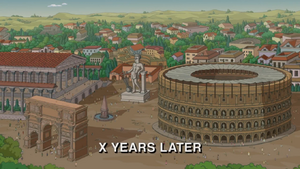
Difference between revisions of "I, Carumbus/References"
Wikisimpsons - The Simpsons Wiki
m (→Cultural references: replaced: {{w| → {{W| (14), {{w2| → {{W2| (4)) |
m (→Cultural references) |
||
| Line 13: | Line 13: | ||
*The words to the song "[[O Ascendimus Nos]]" are a Latin translation of the words to "Movin' On Up", the theme song for ''[[The Jeffersons]]''. | *The words to the song "[[O Ascendimus Nos]]" are a Latin translation of the words to "Movin' On Up", the theme song for ''[[The Jeffersons]]''. | ||
*[[Emperor Quimbus]] sings "[[The Roman Holidays theme]]", the theme song for ''{{W|The Roman Holidays}}''. The song also plays at the end of the episode. | *[[Emperor Quimbus]] sings "[[The Roman Holidays theme]]", the theme song for ''{{W|The Roman Holidays}}''. The song also plays at the end of the episode. | ||
| − | *[[Lady Marjorie]] hosts a {{W|Saturnalia}} party. Saturnalia was an ancient Roman festival and holiday in honour of the god Saturn. | + | *[[Lady Marjorie]] hosts a {{W|Saturnalia}} party. Saturnalia was an ancient Roman festival and holiday in honour of the god Saturn. As it was celebrated in late December and consisted of household decorations and gift-giving, it was essentially "Roman Christmas". |
*[[Bartigula]] declares war on {{ap|Neptune|god}}, the god of the sea. | *[[Bartigula]] declares war on {{ap|Neptune|god}}, the god of the sea. | ||
*The foreign invaders of [[Rome]] are [[Asterix]] and [[Obelix]] from ''{{W|Asterix}}'' and [[Hägar the Horrible]] from {{W|Hägar the Horrible|the comic of the same name}}. | *The foreign invaders of [[Rome]] are [[Asterix]] and [[Obelix]] from ''{{W|Asterix}}'' and [[Hägar the Horrible]] from {{W|Hägar the Horrible|the comic of the same name}}. | ||
Revision as of 21:26, May 22, 2022
|
|||||||||
|
|
|
Cultural references
- The name of the episode is a reference to the novel I, Claudius and a pun on Bart's catchphrase "Ay caramba!".
- "Obeseus" is a portmanteau to "Obese" and "Odysseus".
- Rainier Wolfcastle played the role of a Saxon gladiator from Germania.
- Luigi says "Juno, mother of Apollo", a parody of the saying "Mother of God". The real parents of Apollo are Latona and Jupiter, although Latona was the wife of Jupiter before Juno.
- Barnabas writes "Semper Fratres" on the prison cell wall, meaning "Always Brothers" in Latin.
- The scene of the slaves saying "I had sexicus" is a parody of the "I'm Spartacus" scene from Spartacus.

Mike Duncan served as a Roman history consultant for the episode. Details of Ancient Roman sculptures and architecture can be seen as well
- Ancient Rome buildings such as the Arch of Constantine, the Meta Sudans conical fountain, the Colossus of Nero and the Colosseum can be seen during the episode. Mike Duncan served as a Roman history consultant for this episode.
- The words to the song "O Ascendimus Nos" are a Latin translation of the words to "Movin' On Up", the theme song for The Jeffersons.
- Emperor Quimbus sings "The Roman Holidays theme", the theme song for The Roman Holidays. The song also plays at the end of the episode.
- Lady Marjorie hosts a Saturnalia party. Saturnalia was an ancient Roman festival and holiday in honour of the god Saturn. As it was celebrated in late December and consisted of household decorations and gift-giving, it was essentially "Roman Christmas".
- Bartigula declares war on Neptune, the god of the sea.
- The foreign invaders of Rome are Asterix and Obelix from Asterix and Hägar the Horrible from the comic of the same name.
- Bartigula makes a reference to Hannibal's crossing of the Alps when he says that Obeseus the Wide was one of Hannibal's missing elephants.
- The last scene where the bodies of Bartigula and Obesus lay down with Lady Marjorie crying is a parody of the ending of Gladiator.
- The dialogue between the gods at the end is a reference to the fan opinion of the show going stale and that it should end soon.
Trivia
- Among the slaves that Obeseus was training are Frank Grimes, Karl, Mike Wegman, Smitty and Angry Ricky, who have all at one point been employees at the Springfield Nuclear Power Plant.
Continuity
- The Kent Brockman character calls Obeseus the Wide, Mr. Plow. ("Mr. Plow")
- Obeseus the Wide's size resembles king-size Homer.[1] ("King-Size Homer")
References
